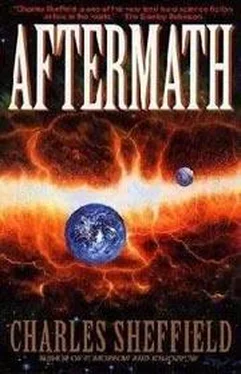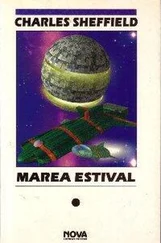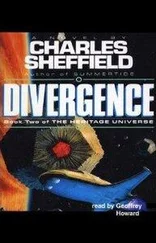Both my vocation and my avocation had taught me patience. The ten minutes of hard work that it took before the headboard came free of the bed frame were rather less than I had expected.
I could not do the same thing with the foot of the bed. What I could do, with some effort, was lift the headboard, my hands still bound to it, right over my body, so that I could bend far enough to get my fingers to the knots on the ropes at my ankles. Seth had tied them tightly, but I had plenty of incentive. After another five minutes I could walk, still dragging the headboard, through to the kitchen where the paring knife lay on the tabletop.
Half a minute of awkward work, and I was free. And now came the hardest moment of all. My instincts told me to grab Methuselah from the car and run, far and fast. It was night, and the chance that Seth or anyone else would be able to catch me was small.
My instincts said that, but they were animal instincts. They were not the correct response for a thinking, analytical mind. I needed not only immediate freedom, I needed freedom from later pursuit.
That called for the use of valuable time, during which Seth might return, alone or with an unknown number of others. It also required that I perform a task both slightly distasteful and physically demanding.
I examined the garden tools in the lean-to by the house. I selected two, either of which could do the job. Then I headed to the car, opened it, and removed Methuselah. It was important to make as little noise as possible, so I pushed the door to but did not slam it. Carrying Methuselah and tools, I set off down the dirt track toward the main road.
Methuselah proved to be easy. The remains of a rusted barrel sat by the track, a couple of hundred yards from the house. I put Methuselah down inside it. The rim was only six inches high, but box tortoises are not given to athletic feats. He would make no effort to leave until he became hungry. I walked on.
It was two more hours before I could return to the house. By that time I was truly as tired as I had pretended to be earlier in the day. This had been a period of unrelenting and continuous effort, sustained by adrenaline and driven by the need to finish as quickly as possible.
The house was silent and empty as I crept through into the bedroom and thankfully placed my burden on the bed. Then the headboard went back to its original position. Finally, I had to make one more decision. Gas, or oil?
Gas has the disadvantage that it calls for judgment. I might easily blow myself up, along with everything else. So it was oil that I poured liberally onto the floor.
While I allowed time for the boards to saturate, I made one more trip to the car. I reached into one of the boxes in the rear compartment, removed half a dozen sheets of paper, and placed them prominently where no one looking into the car could possibly miss them.
Then it was back into the house, for one final brief act. I paused before I performed it. Had I omitted anything? If so, I certainly could not think what it might be.
True, I had not managed to dispose of Seth, an aspiration of mine since our first meeting. But as Longfellow remarks, life is real, life is earnest. It cannot all be simple pleasures.
I made my way down the hill again to collect Methuselah. It was beginning to rain, and I felt weary. All the same, there was joy in my heart and a spring in my step.
The conversion of the big cargo plane into Air Force One was a technical success, but a practical failure. Cargo simply does not have the same needs as humans. One of those needs is warmth. The plane’s interior was not temperature-controlled, and trying to warm it with the available electrical power was like heating a barn with a candle. When Saul stepped out of the aircraft and into the waiting limousine, he felt frozen and semihuman.
Part of the problem was psychological. His mother’s death had been looming closer for three years, ever since the time of her first and minor stroke. The prognosis after the recent stroke had been dismal. Her life had reduced to a misery of sightless, immobile existence, from which he saw her death as a merciful release. In spite of all that, her end still came as a surprise and a defeat.
What was it in the human brain that could see all the evidence of decline, accept it intellectually, and still be shocked viscerally by the final extinction of life?
Saul leaned back as the limousine rolled west into the city. He glanced at his watch. Almost nine o’clock. His meeting with Nick Lopez and Sarah Mander would begin in just over half an hour. Seldom had he felt less up to any challenge.
He went first to his bedroom and ran hot water over his hands. They trembled constantly, and they had almost no feeling in them. He had been awake for thirty-four of the past thirty-eight hours. He examined his face in the mirror. Except for a darkness under the eyes, he looked perfectly normal. That was just as well. Bad enough that he understood his condition, without Lopez and Mander becoming aware of it.
He went to find Auden Travis and Yasmin Silvers, who didn’t know if the meeting was on or off but had stayed on duty in case. He installed them together in an observation room whose display would show the scene in his office. From their shocked expressions, neither knew in advance that the other was also going to be watching the meeting. That was exactly as he intended.
He had ten minutes left when he reached his office. He didn’t feel the slightest bit hungry, but he had eaten nothing since midday. From the credenza behind his desk he took two bars of milk chocolate and a packet of potato chips. After eating half a chocolate bar, he went across and poured himself a strong scotch and water.
A perfectly balanced dinner, and Dr. Forrest Singer should be proud of him. Something from each of the five food groups: fat, salt, sugar, caffeine, and alcohol.
When Sarah Mandei and Nick Lopez appeared together at the open door of his office, Saul was feeling a lot better.
“Mr. President.” After they had expressed their condolences for the loss of Saul’s mother, Lopez stared curiously over to the corner of the office. “There’s something new in here, but I can’t quite say what.”
“Sit down, Nick. You, too, Sarah. I think what you’re noticing is actually something missing. It’s the Disraeli Persona. I’ve retired it.”
Sarah Mander sat down in a flow of flowered print skirt. “Really?” She was as fresh and elegant as Saul felt old and battered. “I thought Queen Victoria’s favorite was your favorite, too.”
“He was. He is. But I managed without him after Supernova Alpha, and I discovered something rather strange. The advice he gave me when the Persona was not working seemed rather better than the advice he offered me when it was. I think he was of his times. As we must be for ours.”
They were outwardly relaxed and inwardly wary. As they should be. He had offered them no agenda for the meeting.
“Occasionally, though,” Saul went on, “I still use Disraeli’s words. Here is something he said: ’Life is too short to be little.’ That is why I have decided to accept your idea of a Pax Americana. I must congratulate you. You realized, long before I did, that this country, because of Supernova Alpha, is in a unique position of power and influence in the world. The idea that we should exert that power is not merely logical, it is essential to the continued existence of this country. And, in fact, of the world.”
Now he had them baffled. With luck he also had them off balance. He went on, “Before I get to that, I want your opinions on a rather different problem. What do you know about Pearl Lazenby?”
Читать дальше












